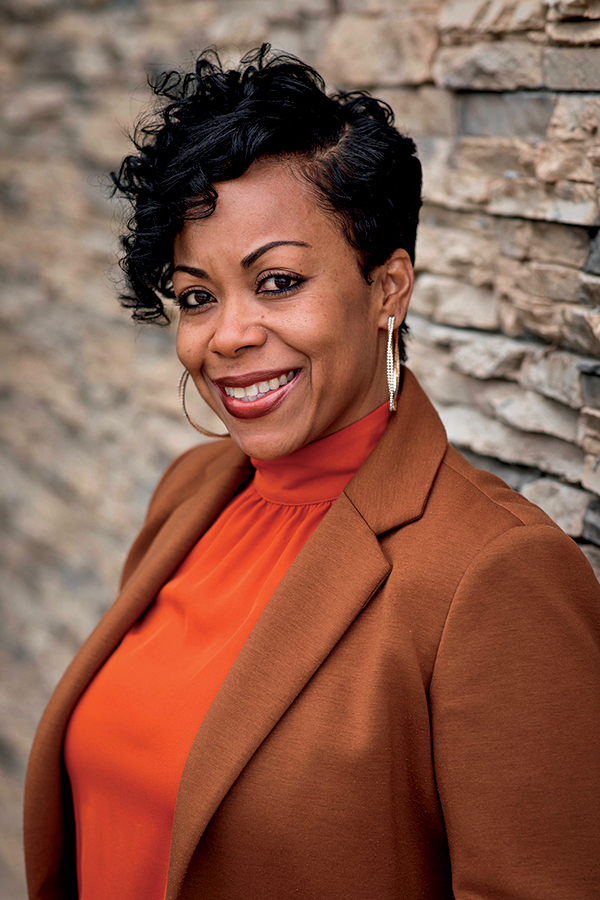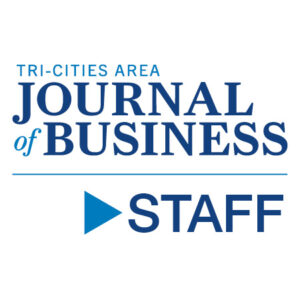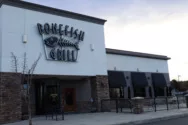
Home » Q&A with Naima Chambers-Smith
Q&A with Naima Chambers-Smith

April 13, 2022
Naima Chambers-Smith
CEO
Tri-Cities Diversity & Inclusion Council

Number of employees you oversee: We have less than five paid employees. However, we have approximately 30 members of the council and over 130 volunteers in the last year alone.
Brief background of your business
or organization:
Tri-Cities Diversity & Inclusion Council (TCD&IC) is a 501(c)(3) nonprofit community organization dedicated to fostering a unified community, embracing cultures and celebrating diversity through education, advocacy and the promotion of cultural competence and compassion.
How did you land your current role?
How long have you been in it?
In October 2019 I invited a group of friends to my home to discuss the idea of creating a nonprofit that focused on diversity, equity and inclusion (DEI). Initially, the plan was to only hold cultural events in the Tri-Cities to not only highlight the beauty in diversity but also educate folks on our differences while bringing the community together. When we began to formally structure our organization, I was voted into the position of our CEO and have held that role since our 501 (c)(3) status was instated back in January 2020.
Why should the Tri-Cities care about what you do?
Tri-Cities residents should care about what the council does because, ultimately, we are here to serve this community. There is not one person in our community who cannot benefit from what the council has to offer. We not only focus on supporting folks from historically underrepresented and under-resourced communities, but we also act as a bridge to close cross-cultural gaps and unite all members of the Tri-Cities.
TCD&IC has five focus areas:
• To act as an information hub to connect marginalized community members to available resources and provide awareness of issues in the community that impact them.
• Offer diversity, equity, and inclusion (DEI) consulting and training to local organizations and businesses to help create inclusive and equitable workplace environments through DEI practices.
• To partner with organizations that support under-represented communities.
• To host yearlong community events that support our mission.
• To provide culturally-specific educational services that promote growth and resiliency in all dimensions of wellness for those most impacted by intersectional oppression, systemic barriers and the impact of cumulative racial trauma.
You were honored with the 2022 MLK Spirit award in February. What did this mean to you and what message would you like to get out as a result?
Being awarded CBC’s 2022 MLK Spirit Award this year came as a surprise and an absolute honor. I’ve mentioned in previous interviews that I’ve never considered my name being mentioned in the same sentence as Dr. Martin Luther King Jr.
He played a monumental role in social justice and positive change, leaving a lasting imprint across the country, and for the role he played in the civil rights movement. Although I truly appreciate the award and recognition, it’s important to me that the community understands that the work of the council is not done by me alone.
There are many amazing individuals that make up TCD&IC from our board, council members, staff, and the hundreds of volunteers across the Tri-Cities who make sure that they show up in allyship and give their all to support TRUE community at every opportunity. For them, I am truly grateful.
Tell us a little about your background. Where did you grow up? Go to school?
I am from Southern California where I lived most of my life. I grew up in both Los Angeles and San Bernardino County. I come from a multicultural, multi-ethnic family. I am the eldest of eight children and have two children of my own. I have over 20 years of progressive law enforcement experience. I am a certified trauma informed care facilitator and ASCENT Leadership graduate. I also hold two DEI certifications in addition to continuous quality improvement and real colors/real teams. I currently work for the Oregon Department of Corrections as the program manager over equity, inclusion, and organizational change, while also serving the Tri-Cities Diversity & Inclusion Council part time as the CEO.
What is the biggest challenge facing leaders today?
I’ve observed that leading with authenticity can be difficult for many leaders. Even myself. We have been socially conditioned to believe that leadership looks like a perfect package and must behave and act a specific way as opposed to seeing the beauty of showing up as our true, authentic selves and embracing our differences, our strengths and all that makes us unique individuals. Being a leader that models authenticity helps others do the same. Leaders are supposed to lead by example, right? Encouraging folks to show up as their true selves creates a culture that supports diversity and inclusion where every person is valued, respected and open to all that makes us different. As a leader, this in turn helps to create healthy workplace environments. For many organizations, the workplace environment is lacking inclusivity and a sense of belonging for ALL. I believe that can be achieved by taking the first steps of leading with authenticity, love, and empathy.
If you had a magic wand, what would you change about your industry/field?
If I had a magic wand, the first wave of my wand would end the philanthropic injustice and bias within the nonprofit sector, ensuring equitable funding practices for nonprofits regardless of the demographic makeup of its leadership. Data shows that nonprofit organizations led by people of color are underfunded and under-resourced.
According to a report published in Philantrophy.com by the consultancy Bridgespan and Echoing Green, an organization that invests in and provides support for leaders of emerging social enterprises, “white-led groups had budgets that were 24% larger than those led by people of color.” It also found that “groups led by Black women received less money than those led by Black men or white women.”
A report by Stanford Social Innovation Review found that “the unrestricted net assets of the Black-led organizations are 76% smaller than their white-led counterparts. Disparities by the race of the leader repeatedly persist even when taking into account factors like issue area and education levels and intersect with gender disparities as well. For example, among organizations in Echoing Green’s Black Male Achievement fellowship, which focuses on improving the life outcomes of Black men and boys in the United States, the revenues of the Black-led organizations are 45% smaller than those of the white-led organizations, and the unrestricted net assets of the black-led organizations are a whopping 91% smaller than the white-led organizations – despite focusing on the same work.”
What advice would you give someone going into a leadership position for the first time?
My advice would be to understand that the role of a leader goes beyond management and titles. The role of leadership comes with great responsibility. As a leader we are responsible for both the failure and success of our organizations, businesses, teams, etc. Leadership defines culture and therefore before going into leadership, I recommend asking yourself, what culture do you want to create? What strengths do you want to help cultivate? Are you willing to support, mentor and coach others? Can you do so with love and empathy? Are you willing to model the behaviors you want to see amongst your team? Are you willing to be accountable for your own behaviors and admit to your own missteps/short comings? I’d also add that leadership requires doing the work of engaging in self-reflection and developing a sense of awareness of our own biases and how our behavior impacts others regardless of our intent. Roy T. Bennett said, “it’s only after you’ve stepped outside your comfort zone that you begin to change, grow, and transform.”
How do you keep your team members motivated?
We keep our council members and team motivated by constantly tying the work we do to our mission statement and reminding them of the many stories shared by community members and themselves on the positive impact that our work has had on the community that we serve. We also make sure that each event and council meeting is fun, inspiring, and builds a sense of community.
What is one characteristic that you believe every leader should possess?
This is a really hard one to answer. If you asked for the top two, I would narrow it down to love and empathy. In my opinion love for others and for the work you do is a crucial characteristic for any leadership role. I also believe that in addition to leading with love, leading with empathy is imperative to your success as a leader, those you support and the impact of the work that you do. Making the effort to put yourself in the shoes of others and imagine seeing the other persons’ perspective helps us connect with each other with both our hearts and our minds. I believe practicing empathy as a leader encourages others to do the same.
How did you decide to pursue the career that you are working in today?
Prior to relocating to the Tri-Cities I expected to remain working in the juvenile justice system. I didn’t see a future where I wasn’t supporting youth, helping them discover their potential, or an understanding that they didn’t have to be victims of their circumstances. When I moved here and started with the Department of Corrections, I struggled finding a sense of belonging and happiness. This led to my participation in the DEI committee at work. That inspired me to take diversity certification courses to become educated on how to implement DEI best practices within the agency. That in turn inspired the birth of the council. At the time, I couldn’t see beyond the divisiveness and our siloed communities. I didn’t realize the need for culturally specific programs, DEI education, or the impact that the council was capable of making. I guess you can call it divine intervention. God ensures that the universe continues to unfold and guide my path. I’ve learned that the path we think we’re supposed to take is not always the one that is meant to be. I’m just grateful that my current path has created opportunities to enrich the lives of so many organizations and individuals in a variety of ways.
How do you measure success in your workplace?
I measure success within the council by the level of engagement and the extent to which folks feel a sense of inclusion and belonging. This goes for our members, volunteers and staff. While I recognize that there is always room for improvement, having an environment where people feel comfortable to show up authentically, voice their opinions without fear and apprehension, feel heard and appreciated, and use their strengths to support the team to the best of their ability … that is success!
What do you consider your leadership style to be?
Recognizing that some leadership models become outdated, and that transformational leadership is the kind of leadership model our current workforce is looking for, I consider my leadership style to be one that is constantly evolving to meet the needs of those I support while constantly learning and growing to become a better version of myself. If I had to choose today where my leadership style currently lies it would be between servant leadership and visionary leadership, both of which has their strengths and weaknesses.
How do you balance work and family life?
Most recently, it has been making a better effort to have a cut off time for work in the evenings. I must admit that achieving a work-life balance is a constant work in progress for me. It’s something I find myself working at daily because for someone who is task oriented and results driven, I find it extremely challenging. I’m blessed to have accountability partners, great friends, family and a therapist to help remind me when I’m not taking the time to engage in self-care as well as “call me in” to have the difficult and sometimes uncomfortable conversation when they recognize an imbalance and the need for me to give one area or other in my life more focus and attention.
What do you like to do when you are not at work?
When I’m not working, I love to spend time with family and friends. I enjoy feeding those I love which usually looks like me cooking or providing food for us to share and spending time with one another. I also enjoy shopping, watching a good movie or reading a good book. Traveling and learning about food and culture is also at the top of my list and something I’d like to do more of.
What’s your best time management strategy?
My best time management strategy is utilizing my calendar. Without it, it’s easy for me to get lost in time which can mean spending more time on one task than the other. My other, is making lists. I am a Post-it note person. Often, my desk is filled with them! But they act as reminders for me.
Best tip to relieve stress?
Breathe. I’ve recently discovered just how impactful taking a few minutes to take deep slow breaths can have on slowing the central nervous system down and having a calming effect when experiencing heightened emotions and stress. Five seconds in through your nose and 10 seconds out through your mouth almost instantly works.
What’s your favorite podcast? Most-used app? Favorite book?
As of recent, my most-used app is the Calm Radio app or even YouTube. I have difficulty sleeping sometimes and I’ve learned that the Calm Radio app and its various sounds as well as You Tube’s “fan sound for sleep white noise,” works magic for me. I have several books that I would call favorites, however, if I had to narrow it down to one book that I would recommend to any and everyone, it would be “The Four Agreements” by Don Miguel Ruiz.
Do you have a personal mantra, phrase or quote you like to use?
I believe engaging in positive self-talk is a healthy practice. Depending on the situation, repeating mantras to keep us focused, encouraged, calm, etc., looks different. I use a few. During emotionally heightened/tense conversations: “Focus on the end goal” or “Live with the end in mind” (S. Covey) or “Don’t take it personally” (Don Miguel Ruiz).
When I’m nervous, doubting myself or feeling discouraged, “You’ve got this.” I would also say focusing on my own purpose statement which is to, “inspire love and impact change.” This keeps me grounded and helps me consistently tie my actions and words to what I believe is my life’s purpose.
Q&A Local News Diversity
KEYWORDS april 2022





